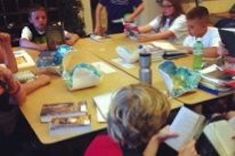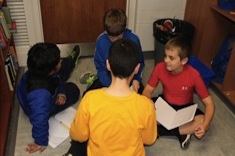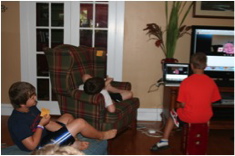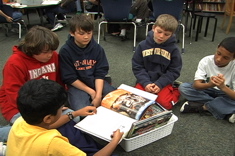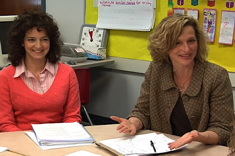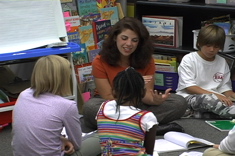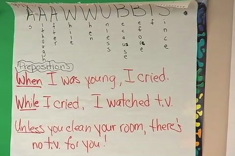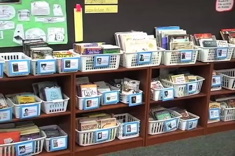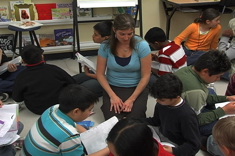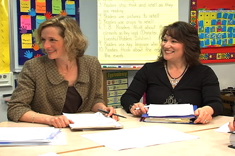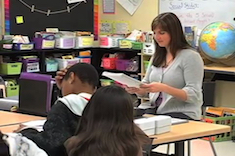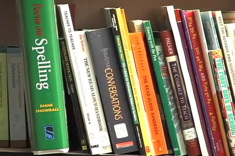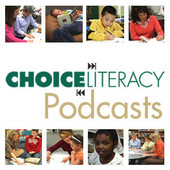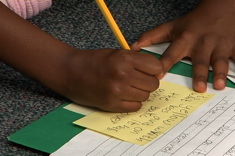Articles
Here is where you’ll find all the latest print features from our contributors. If you’d like to browse specifically by grade level, topic, or contributor, you can use the links in the right sidebar.
Latest Content
Lines Written at Lunchtime Above Tintern Abbey
Shirl McPhillips celebrates high summer, friendship, and handwritten notes in this poem and reflection.
Making Thinking Visible
A class blog proves to be a surprisingly successful tool for building academic connections within and across classrooms of Gretchen Taylor’s middle school students.
The ABCs of Literacy Coaching (Part 1)
Heather Rader shares the essential elements of successful literacy coaching in this first installment of a month-long series.
Ask Me – I’m Not the Expert
Heather Sisson explores the complicated links between relationships and expertise for literacy coaches and teachers.
Making the Switch from Desks to Tables
Moving from desks to tables when redesigning a classroom is about a whole lot more than just furniture. Katherine Sokolowski explains what the change has meant to her classroom.
Worldwide Cinderellas
Erin Ocon discovers that worldwide Cinderella stories are a wonderful tool for building community and cultural awareness in her seventh-grade classroom and with English language learners. Erin describes how she uses a range of Cinderella picture books with students, and provides an extensive booklist for expanding your library.
What is the Content for Small-Group Instruction? (Part 2 of the Grouping Series)
Heather Rader considers how assessments and observations might be used to create flexible groups.
Don’t Be a Sneetch
Amanda Adrian ponders end-of-year celebrations, as well as the haves and have-nots, in schools.
An At-Home Summer Reading Camp
Katherine Sokolowski comes up with a novel way to boost kids’ reading and her summer income —hosting a reading camp in her home.
Matching Students to Nonfiction Texts in Grades 3-6 (BOOKLIST)
In this booklist, Mary Lee Hahn offers creative categories for considering readers in new ways.
Professional Development Closing Activities (ROUND-UP)
This round-up is on professional development closing activities includes contributions from Jennifer Allen, Aimee Buckner, and Heather Rader.
The Five-Minute Solution: Mini-Groups after Minilessons to Maximize Conferring Time
Aimee’ Buckner’s mini-groups are an easy and simple way to differentiate instruction in workshops, and save time when conferring.
Extreme Makeover: Revision Edition
Heather Rader finds short text and shared modeling of revision strategies are just the scaffolds students need to see the power of revision for improving writing.
Getting Started with Sentence Observations
Karen Terlecky details the assessments and preparation that goes into the design of her sentence observation program.
What to Say on Parent Teacher Night
Clare Landrigan and Tammy Mulligan present some of the anecdotes and research they would share with parents during open houses and conferences.
Connecting Read Alouds and the Literacy Curriculum at the Start of the School Year
Here are some ways to link read alouds with learning across the curriculum at the start of the year, suggested by Choice Literacy readers.
If You Like Junie B. Jones, You Might Like . . .
What young learner doesn’t love Junie B. Jones? Franki Sibberson shares great texts to recommend for readers who adore Junie and might be looking for similar characters and plots.
Fresh Books and Age-old Skills
Suzy Kaback provides a booklist of newer texts that can be used to teach multiple reading strategies.
Vocabulary, Comprehension, and the Common Core: A Conversation with Doug Fisher (PODCAST)
In this podcast, Doug Fisher discusses how vocabulary fits into the Common Core State Standards.
Every. Single. Day.
Ruth Shagoury listens in as Katie Doherty's students give advice to a new classmate, and in the process reveal the norms and expectations for reading and writing workshops.
Telling Our Stories
Ruth Shagoury and Andie Cunningham beautifully weave together poetry and storytelling in a potent professional development activity for teachers.
You’ve Got to Be Joking
A first-year teacher struggles to manage a class with boys who are cut-ups. From the lemons to lemonade department, Heather Rader helps him build on student strengths by developing a popular writing unit on joke writing.
Making Assumptions
The shift from teaching children to mentoring adults can be difficult for many educators. Ellie Gilbert chronicles the biggest assumptions that harm collaborative relationships with colleagues.
The Power of Powerpoints for English Language Learners
Erin Ocon discovers a surprising tool to help her middle school English language learners develop their writing and oral language skills — Powerpoint presentations. Erin shares some practical tips for using presentation software to support English language learners.
From “I Don’t Get It” to “Never Mind — That’s Amazing!”: Scaffolding Schema for Comprehending Poetry
Katie Doherty finds poetry is a powerful tool for helping her middle school students understand the value of schema while reading.
I Can’t Quite Put My Finger On It
Have you ever had a teacher enthusiastically embrace a new “magic bullet” instructional program that includes scripted or rote elements that concern you? Melanie Quinn considers this sticky situation instructional coaches sometimes find themselves in, and comes up with some starting points for conversations with colleagues.
Tried and True Trumps Shiny and New
Amanda Adrian explains why running records are still an essential tool in any teacher’s assessment arsenal. She also includes links to web resources for honing your running record skills if they are a bit rusty.
Rumor Has It
Lisa Koch says we should get our students to start some rumors — about characters, that is.
Literacy Coaching and Student Work with Diane Sweeney (PODCAST)
Diane Sweeney talks about the importance of focusing more on student work and less on teacher plans and lessons for literacy coaches.
Sticky Little Invention (The Post-It Essay)
Jill Ostrow describes how the "post-it essay" is an ingenious way to get richer responses to displays of learning. Jill is working with teachers, but this is another writing activity that can be adapted for use with teens or tweens.
Browse Content By
Type
Category
- Assessment Tools
- Big Fresh Archives
- Booklists
- Choice Numeracy
- Classroom Design
- Common Core
- Community Building
- Conferring
- Content Literacy
- Digital Literacy
- English Language Learners
- Equity
- Family Relations
- Free Samples
- Guiding Groups
- Leadership
- Literacy Coaches
- Mentor Texts
- Minilessons
- New Teacher Mentors
- Podcasts
- Poetry
- Quote Collections
- Reading Strategies
- Self Care
- Struggling and Striving Learners
- Talking and Listening
- Teacher Study Groups
- Teaching Reading
- Teaching Writing
- Word Study and Vocabulary
Author
- Melissa Quimby
- Nawal Qarooni
- Gwen Blumberg
- Julie Cox
- The Lead Learners
- Hannah Tills
- Josie Stewart
- Ruth Metcalfe
- Mallory Messenger
- Becca Burk
- Jodie Bailey
- Vivian Chen
- Mary Brower
- Tiffany Abbott Fuller
- Stephanie Affinito
- Ruth Ayres
- Leigh Anne Eck
- Heather Fisher
- Shari Frost
- Julie Johnson
- Suzy Kaback
- Gigi McAllister
- Shirl McPhillips
- Melanie Meehan
- Cathy Mere
- Debbie Miller
- Tara Barnett and Kate Mills
- Tammy Mulligan
- Dana Murphy
- Bitsy Parks
- David Pittman
- Brenda Power
- Heather Rader
- Matt Renwick
- Mandy Robek
- Christy Rush-Levine
- Gretchen Schroeder
- Jen Schwanke
- Brian Sepe
- Katherine Sokolowski
- Stella Villalba
- Jennifer Vincent
Grade Level
Choice Literacy Membership
Articles
Get full access to all Choice Literacy article content
Videos
Get full access to all Choice Literacy video content
Courses
Access Choice Literacy course curriculum and training





